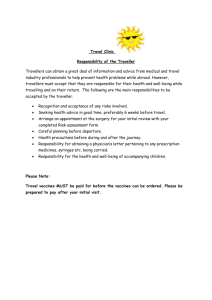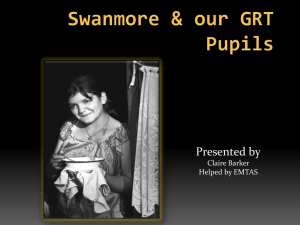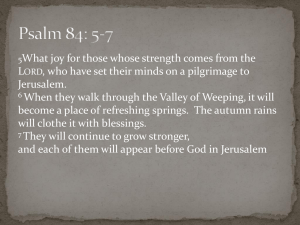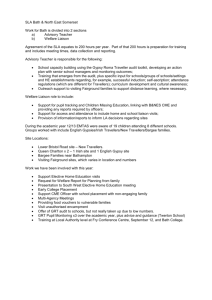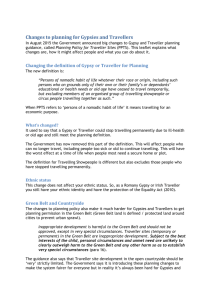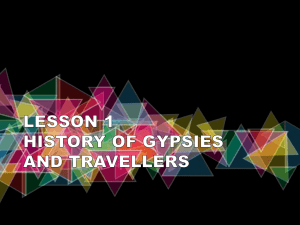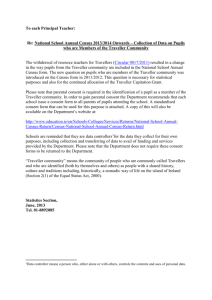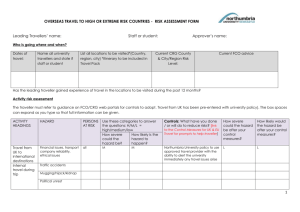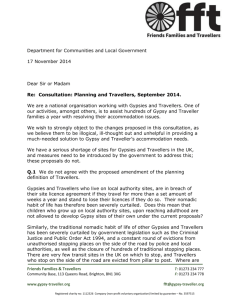A Study of Discrimination against Members of the Travelling
advertisement
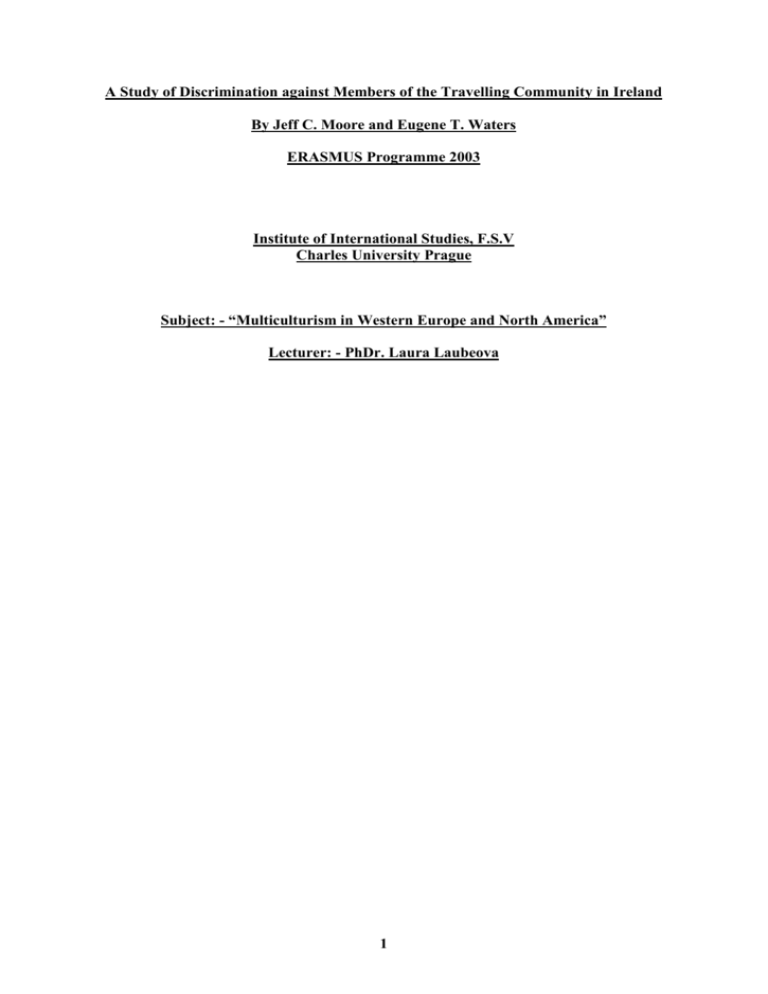
A Study of Discrimination against Members of the Travelling Community in Ireland
By Jeff C. Moore and Eugene T. Waters
ERASMUS Programme 2003
Institute of International Studies, F.S.V
Charles University Prague
Subject: - “Multiculturism in Western Europe and North America”
Lecturer: - PhDr. Laura Laubeova
1
Table of Contents
SECTION 1
Introduction
p3
SECTION 2
TRAVELLERS: How are they different?
p2
Section 2 >2.1
Origins
p2
Section 2 >2.2
Values and Customs
p4
Section 2 >2.3
Time Orientation
p6
SECTION 3
TRAVELLER DISCRIMINATION
p8
Section 3 > 3.1
Ways in which Travellers are discriminated
against
p 10
Section 3 > 3.2
Statistics Concerning Traveller Discrimination p 12
Section 3 > 3.3 (a)
Traveller Discrimination in the context of the
U.N. Declaration of Human Rights
p 14
Traveller Discrimination in relation to the
Policies of the Irish Government
p 16
SECTION 4
SUGESSTED FURTHER ACTION
p 18
SECTION 5
CONCLUSION
p 20
Section 3 > 3.3 (b)
2
SECTION 1
Introduction
There are approximately 25,000 members of the Travelling community at present living in the
Republic of Ireland. These people, who as we shall show, have their own very own distinct culture,
language, history, value system and psyche are often treated as degenerates of “normal” society.
This brief study aims to give a broad overview of the situation of Travellers in Ireland with a
particular emphasis on ways in which Travellers are discriminated against in what is supposed to
be a modern, progressive European nation.
SECTION 2
Travellers : How are they Different ?
> 2.1
ORIGINS
The origins of Irish Travellers has long been a difficult topic. Taditionally, historians have
believed Irish travellers were descedants of people who lost their land during the Irish Famine.
Michael McDonangh, the Irish representative on the world gypies council, claims that this idea is
no longer valid. He states that evidence of Irish Traveller culture has been found in writings and
other works prior to 1843 ( the Iirsh Famine took place between 1843-45 as a result of a potatoe
blight). McDonagh also states that this common misunderstanding about Irish Travellers makes
them look as though they originated from disaster, that they are misfits. Most historians have
disregarded this concept of Irish Traveller origin. Owen McNeil in his book “phases in Irish
history” claimed that Irish Travellers are direct descenants of an industrial community that lived in
Ireland in pre-Celtic times. This concept seems to make sense when one considers the Industial
nature of Irish Travellers. Within Ireland, Travellers are often refered to as “Tinkers”. This word
has been found in Irish literature prior to the 12th Century. The word “tinker” refers to tin craft, a
craft that Irish travellers have until recent decades been renouned for. The decline of crafts like
these and the move into the technological and mechanical age has had detrimental effects on Irish
Travellers. The decline in the need for these crafts has meant travellers are no longer regarded as
productive in Irish society.
3
Irish Travellers also have a destinct language of their own. This language serves as evidence
that Irish travellers have thier origins prior to the Famine. This Language, which is called Gamon
and Cant ( or Shelta, as the lingistic call it), has its origin in ancient Irish. This was spoken before
the 12th Century and was heavily used in Religious circles. Furthermore, there a many similarities
between Irish Travellers and figures in ancient Irish mythology, like Cu Culainn and Queen Meaves
Army (two of the most famous figures of Irish mythology).
Within Irish society, the misconception that Travellers are misfits of mainstrem society has
stemmed from the incorrct historical concept of Travellers. Modern concepts of Traveller origin are
moving to rectifiy this and as we shall stress later, Irish Society must begin to better understand
Travellers if there is to be a significant shift in the attitude of Irish society towards this minority
group.
> 2.2
VALUES & CUSTOMS
Traveller’s have their own distinct set of values and customs. An important point to note in
this regard is that Travellers are a deeply Catholic group. Travellers rarely miss Mass and other
religious ceremonies, such First Holy Communion, confirmation, confession and patterns (the
annual visiting of the graves of loved ones). This Catholicism is a contributing factor to the most
vivid of Traveller values and customs: the importance of the family unit. Travellers have almost
obsessively close-knit family units. It is rare to find a Traveller anywhere by his/herself. Part of the
reason for this is because the Traveller views him/herself as distinct from the rest of Irish society
and as such longs to be near people of his/her own background, language, culture etc.
Another distinct facet of Traveller culture is the strong role of economics on the Traveller
psyche. This is not so much economics in the traditional sense of numbers and figures so much as
the acute ability to discern the monetary value of a given object. Travellers have traditionally
4
collected and salvaged what the settled community regards as ‘waste’ or ‘scrap’ items and
Travellers can be found operating stands at fairs and festivals throughout Ireland selling items such
as clothes, carpets, tools and electronic goods such as radios and watches. Because of this lifestyle,
‘bartering’ is a strong part of the Traveller’s day to day life and even the youngest members of the
Traveller family are expected to contribute to the economic welfare of the group. As a result of this,
a Traveller child would be able to arrange a group of objects in accordance to their monetary value
far better than a settled child. Unfortunately, this is a skill that is not recognized or utilized by either
Irish society or the National Curriculum. In fact, many people treat Travellers with ungrounded
suspicion precisely because of this attribute because they feel that Travellers are somehow
‘evaluating’ the worth of their property. This has led to Travellers becoming the first people to be
blamed when property is stolen from settled people.
Travellers have their own distinct language, known as ‘cant’ or ‘gammon’. This has its roots
in early Gaelic and although it is not widely used by younger Travellers it is fair to say that even the
dialect of English that Travellers use today is quite different to that used by mainstream society.
Music, fairytale and folklore are also a large part of Traveller culture. It is important to note
that the heroes of Traveller ballads often display characteristics, which would most definitely place
them as the bad guys in the equivalent settled folklore. For example, whereas heroes and heroines in
Western tales display courage in the face of adversity and self-sacrifice and other noble acts. Heroes
in Traveller folklore are often thieves and robbers and are often praised for their cleverness and
ingenuity in their ability to ‘con’ people out of their valuable possessions in order to continue their
nomadic existence. This can be seen in the Travellers genuine delight in closing a deal as the
Traveller has thus ensured that he can continue his chosen lifestyle without succumbing to the
regular lifestyle patterns of settled society.
5
> 2.3
TIME ORIENTATION.
Another element of Traveller culture and value is their distinct time orienation. Their concept of
time is one of present time orienation, meaning that Travellers live their life with little thought for
the future and are, in fact, fatalistic about thier own future. Travellers view time in terms of “good
times” and “bad times”, this is intrinsically linked to pleasure and pain, which in turn is a result of
the importance Travellers put on physical survival. The importance Travellers put on physical
survival is often citied as as the reason for their resourcefullness. This is a distinct element of
Traveller values. However, as I wll discuss later, little emphasis is placed on this within the Irish
education system. Travellers deal with periods of time, like that of child birth and times which are
important to their life, rather than mainstream society’s time concept of the working day, the
weekend and annual holidays.
This time orienation has many consequences. Firsty, Travellers tend to live a “hand to mouth”
existance. They look to secure their present situation. Unlike mainstream society, Travellers see
little use in saving for the future. This often means that Traveller children are at a disadvantage in
terms of education, especially third level education. Even though Third level education is non-fee
paying there is still a heavy enterance fee. Travellers themselves, although most now understand the
importance of eduction, place more importance on income. This present time orienation also causes
problems with regard to school attendance. Their nomadic lifestyle aside, it is not in the Travellers
nature to live thier life under strict patterns the way mainstream society does and this can be put
down to thier present time orienation.
Furthermore, Travellers are often regarded (within Ireland) as overtly violent. They have a
reputation for school yard violence. It has been claimed by Irish sociologists that this is a result of
their present time orienation. We will talk of the discrimination within schools further, but suffice to
say here that little respect is given to Traveller culture within Irish schools. Travellers place ultimate
importance on thier family ties. When the family unit is disrespected in some way it can often lead
6
to violence. Travellers present time orienation means that they pay little heed to the consequences
of this violence , at least not in the same way that a sendantary child might. Moveover, these family
ties create further problems within educational circles. The competitive nature of western education
is alien to Traveller values. Again, Traveller children often seek to help family members complete
course work (Travellers children normally attend school in groups).This attitude is frowned upon
within the Irish education system. What begins to become clear when one considers Traveller time
orienation is that Irish society and education does little to facilitate this orienation. Irish society,
with its typically ethnocentric views, holds that this present time orienation is somewhat of an
underdeveloped behavioural pattern.
SECTION 3
Traveller Discrimination in Ireland
> 3.1
Ways in which Travellers are Discriminated Against.
(a) Accommodation
The most obvious aspect of Travellers culture is their nomadic lifestyle. As mentioned previously,
crafts like that of tin craft have been an important part of Traveller trade. Consequently, their living
space and working space are one and the same. Sedentary people regard this as a distinctly negative
aspect of Traveller life. Their sites are seen by sedentary people as unclean, as they do not uphold
mainstreams societys idea of what living conditions should be. Furthermore, little emphasis is
placed on the importance of providing living and working space together for Travellers. Irish
society is guilty of the N.I.M.B.Y. syndrome. Meaning that we are willing to facilitate Travellers, as
long as they are “not in my back yard”. This goes hand in hand with the fact that most legislation
regarding accommodation for Irish travellers remains incomplete. For example in 1995 a task force
recommended that 3100 units of accommodation be set up. However, by 2000 only 127 of these
units had been established. From section 3.2 one can also see that what has been established lacks
basic facilities, which sedentary people take for granted.
7
Although in recent years there has been an increase in provisions made for Travellers
accommodation, problems still remain with the underlying aim of these policies. For example,
sociologists claim that these provisions place an over emphasis on standard housing. In 1995 there
were 1,630 travellers living in standard housing and this figure had risen to 2,272 by 2001 (see 3.2
for details). Put simply, policy is aimed towards assimilation rather than accomodation of Traveller
needs. With regard to halting sites, too many of these sites are temporary sites. The problem with
these temporary sites is that all too often they become permanent sites. Consequently, they lack the
basic falicities that a permanent site would offer. As a result of this, fewer families are using these
facilities. There are more Traveller families on the road side today than in the 1960’s.
(b) Health
Firstly, it is important to stress that the issue of health with regard to Irish travellers is intrinsically
linked to accommodation. The lack of facilities in Travellers sites results in low standard health and
health care. As we can see from section 3.2 infant mortality is three times greater within the
Travelling communittee. Consider that 16 percent of Travelling communittee in Dublin in 1996 had
no water supply and one begins to see the relevance this has to Traveller health.
As with education, discrimination of Travellers is evident within the health sector. Older Travellers
will often be reluctant to visit their local G.P. as he may talk in alaborate academic terms.
Furthermore, Travellers may have trouble with long perscriptions. They lack the “standard”
education to understand these perscriptions and are often talked down to by doctors.
Although there is evidence of discrimination against Travellers regarding health, provisions to
rectify accommodation problems might go some way to solving this problem.
8
(C) Education
The lack of provision towards Travellers within Irish education is one of the most pressing
problems. As with all ethnic minorities, western education has a hidden curicullum and it is biased
against these minorities. For example, Teachers at second level tend to speak in academic terms and
these are that of the middle class. Clearly, Travellers are at a disadvantage from the early years of
their education. Bordeau’s thoery of Cultural reproduction states that education will not allow
change to those who attend school without the standard cultural upbringing.Travellers
will,therefore, lack the basic general knowledge and verbal skills which come as part of cultural
experience. Western society talks of education in terms of Mathematical and verbal skills and this
places little relevance on travellers resourceful and pragamatic nature. As Gardener believes this is
simply a different type of intellignece (Gardener states that there are eight types of intelligence).
This theory serves as evidence of the failings of IQ tests such as the “Bell Curve”. This test does not
allow for other types of intelligence. Travellers are simply culturally incompatable to the education
system ( Willis, 1978). The Irish education system does little to accommodate this fact.
Standard education is also unwilling to facilitate many of the values which are central for
Travellers. As mentioned before, present time orienation means Traveller attendance can be a
problem. The introduction of laws to make Travellers go to school has increase to numbers who do
attend, but there is an element of reluctance as a result. Family ties and the attendance at family
rituals also prevents the type of attendance which the Irish education system requires. Of course,
what is forgotten is that as a result of their involvment in family decisions, the Traveller child will
be more educated in matters such as death and child birth. Stemming from this, Irish education
neglects matters which are relevant to Travellers. In primary education, children are taught about
fire safety for the sedentary communittee but, safety on a caravan site is neglected. This is
something which must be analyseed when considering Traveller health care.
9
Finally, little consideration is given to the positive aspects of Travellers culture. There are moral
overtones in much of what is implied within education. The term “settled people” imlpies that
sedentary people are somehow more structured in every aspect of life. Irish education needs to
incorpoate the positive aspects of Traveller culture in its curiculum, such their intense family values
in order to view Travellers values in line with mainstream values; as distinct cultural values which
are just as valid as those of the sedentary community.
> 3.2
Statistics Concerning Traveller Accomodation
Note: All Statistics taken from the Websites of The Irish Traveller Movement and Pavee
Point, the two largest Traveller Representative groups within the Republic of Ireland.
A 1994, a Dublin Accommodation Coalition with Travellers survey of Dublin City and County
found:
Total number of families
>652
Without flush toilets
36%
Without toilets
28%
Without electricity
53%
Without bath or showers
53%
Without refuse collection of any
kind
10%
Cold water only
53%
No water supply
16%
No public phone on the site
100%
Fire precautions on site in working
order
10%
No fire precautions
58%
Space set aside for scrap trading
5%
10
The Task Force Report on the Traveller Community (1995) identified a comprehensive range of
recommendations, but despite progress on some of these, the major recommendations have yet to be
implemented (eg a Traveller Education Service and the development of an intercultural curriculum).
Statistics
Lack of precise and detailed data is an issue in providing services to Travellers, including education.
The National Traveller Education Officer estimates that in 1999.
6,000 Traveller children attended Primary schools
1,000 Traveller children attend mainstream Post-Primary schools
And in 1998, 20 Traveller children attended 6th year Post-Primary
Less than 20 Travellers attend Third Level colleges. Six hundred Traveller children attended 52
pre-schools around the country in 2000 and 742 Travellers aged 15 years and upwards trained at
20 Senior Traveller Training Centres, run by the Department of Education and Science.
Population
We
estimate
Structure
that
in
the
year
2000
there
are
about
25,000
Travellers
in
Ireland.
Among Travellers there is a relatively large number of infants and children and few older persons.
This is because there is a high birth rate and low life expectancy. Traveller life expectancy is
equivalent
to
that
of
settled
people
in
the
1940s.
According to an 1986 Economic and Social Research Institute report (the most recent figures
available):
Over 50% of the Traveller population are under 15 years of age and 40% are under 10 years
of age.
Up to the age of 24 years, there is a higher ratio of Travellers compared to settled people. After
that, the ratio falls sharply.
Only 5% of Travellers live to be 50 years old.
One per cent of Travellers live to be 65 years, compared to 11% of the settled population.
Only 5% of Travellers live to be 50 years old
1% of Travellers live to be 65 years compared to 11% of the settled population.
11
Figures of the number of Traveller families accommodated between 1995 and 20015
1995
1996
1997
1998
1999
2000
2001
Total Number 1063
of Families
accommodated
in Halting
sites
Total Number 301
of families
accommodated
in Group
Housing
Total
1143
1134
1148
1100
1152
1192
Total Increase
in the Number
of Families
accommodated
129
321
324
339
356
380
456
115
244
Most of the progress has being made in relation to providing standard housing as the
following figures illustrate:
Figures of the number of Traveller families accommodated in standard housing between 1995 and
20016
Total Number 1630
of Families
accommodated
in Standard
Housing
1741
1817
1900
1973
2110
2272
642
PUBS
89.7% said they
went to a pub
77.2% had been told to
leave a pub by bar staff
78.6% had been
refused a drink
70.8% had been refused
"because we were Travellers"
HOTELS
60.8% said they had
tried to book a hotel
46.9% said that it was
"because we were
Travellers"
75.7% of these had
experienced problems
SHOPS
12
44.9% were asked
to leave or cancel
53.9% said they had been
asked to leave a shop
66.1% had experienced others
being served before them
60% had been "made a show of"
(embarrassed) in shops
31% had experienced others
being served before them
28.3% had been "made a show of"
(embarrassed) in a hairdressers
25.5% had experienced others
being served before them
24.7% had been "made a show of"
(embarrassed) in a laundrette
HAIRDRESSERS
32.5% said they had been
asked to leave a hairdressers
LAUNDRETTE
18.2% said they had been
asked to leave a laundrette
SECTION 3
> 3.3
TRAVELLER DISCRIMINATION (continued)
Discrimination in the context of Irish/European law and the U.N.
Decleration on Human Rights
>3.3 (a)
United Nations Declaration on Human Rights in Relation to Irish
Travellers
Article 2.
Everyone is entitled to all the rights and freedoms set forth in this Declaration, without
distinction of any kind, such as race, colour, sex, language, religion, political or other
opinion, national or social origin, property, birth or other status. Furthermore, no distinction
shall be made on the basis of the political, jurisdictional or international status of the country
or territory to which a person belongs, whether it be independent, trust, non-self-governing
or under any other limitation of sovereignty.
[This Article should ensure that Travellers should have equal status with settled people
in regards to the U.N. Decleration on Human Rights]
Article 13.
(1) Everyone has the right to freedom of movement and residence within the borders of each
state.
(2) Everyone has the right to leave any country, including his own, and to return to his
country.
13
[Both these Articles but especially part (1) are relevant to the situation of Travellers in
Ireland. e.g. Travellers are not impeded in their movement within the Republic,
HOWEVER, large restrictions are placed (throughout society) as to where Travellers
may také up residence within the State. This is a violation of Article 13, (1)]
Article 18.
Everyone has the right to freedom of thought, conscience and religion; this right includes
freedom to change his religion or belief, and freedom, either alone or in community with
others and in public or private, to manifest his religion or belief in teaching, practice,
worship and observance.
[Travellers are often made to feel unwelcome in both Churches and in schools
(especially in affluent areas within society). This prejudice against their freedom of
religious practice and their right to freedom thought (see Section 3 {3.1} in relation to
the „hidden curriculum“) is a direct violation of Article 18.]
Article 21.
(1) Everyone has the right to take part in the government of his country, directly or through
freely chosen representatives.
(2) Everyone has the right of equal access to public service in his country.
(3) The will of the people shall be the basis of the authority of government; this will shall be
expressed in periodic and genuine elections which shall be by universal and equal suffrage
and shall be held by secret vote or by equivalent free voting procedures.
[ (1) The innate racist tendencies of the majority of the Irish population with regards to
Travellers in Ireland ensures, albeit in a non-direct and quite subversive way, that
there has never been a member of the Traveller community in Government in Ireland.
(2) Access to public services has been one of the main areas wherein Travellers have
been discriminated against due solely to their ethnic background. (3) As Travellers do
not have a fixed abode, many Travellers do not recieve polling cards. Also, as many
Travellers are illiterate, they simply could not use the ballotting box. (This has been
somewhat addressed in regards to General Elections with the introduction of pictures
beside candidates names, however Referenda ( often relating to topics which are
central to Traveller culture) are still a major problem.]
Article 25.
(1) Everyone has the right to a standard of living adequate for the health and well-being of
himself and of his family, including food, clothing, housing and medical care and necessary
social services, and the right to security in the event of unemployment, sickness, disability,
widowhood, old age or other lack of livelihood in circumstances beyond his control.
(2) Motherhood and childhood are entitled to special care and assistance. All children,
whether born in or out of wedlock, shall enjoy the same social protection.
[ (1) As we have shown in Section 3 {3.2}, the standard of living provided by the State
with regards to teh Traveller community is in direct violation to many areas outlined
14
in section (1) of the above Article e.g. „medical care and necessary social sevices“. (2)
Almost all Travellers are born as home births. Lack of access to medical supplies and
qualified mid-wives results in heightened danger of complications for both mother and
child]
Article 26.
(1) Everyone has the right to education. Education shall be free, at least in the elementary
and fundamental stages. Elementary education shall be compulsory. Technical and
professional education shall be made generally available and higher education shall be
equally accessible to all on the basis of merit.
(2) Education shall be directed to the full development of the human personality and to the
strengthening of respect for human rights and fundamental freedoms. It shall promote
understanding, tolerance and friendship among all nations, racial or religious groups, and
shall further the activities of the United Nations for the maintenance of peace.
(3) Parents have a prior right to choose the kind of education that shall be given to their
children.
[As we have already outlined in Section 3 {3.1} almost all of the clauses have been
violated in relation to Traveller education. Note the italicised and underlined sections
of sections (1) & (2) where we have highlighted just how blatantly juxtopposed to the
Decleration, the reality of education is for Travellers in Ireland.]
Article 27.
(1) Everyone has the right freely to participate in the cultural life of the community, to enjoy
the arts and to share in scientific advancement and its benefits.
[Denial of access to public houses, theatres and cinemas etc. is just one way in which
Travellers rights are diminished in relation to Article 27 above.]
Section 3
TRAVELLER DISCRIMINATION
>3.3(b)
Role of the Irish Government and Irish legislation in
Discriminating against Travellers in Ireland.
The main area in which we see a discrimination against Travellers in Ireland on behalf of the
State is in the Failure of the Irish Government, as with Irish society in general, to provide in practice
the basic necessities, i.e. health, education and accommodation, that it is bound to do for ALL of the
citizens of the Republic.
As we have already dealt briefly with education and health in Section 3, (3.1) let us now turn
our attention to the key area of accommodation for Travellers.
15
(i)
One of the most disturbing problems for Irish Travellers is the common practice of forced
evictions:
“The meaning of forced eviction as defined by the UN Committee on Economic, Social and
Cultural Rights, is “the permanent or temporary removal against their will of individuals, families
and/or communities from the homes and/or land which they occupy, without the provision of, and
access to appropriate forms of legal or other protection.”
Are forced evictions permitted?
Instances of forced evictions are prima facie incompatible with the requirements of ICESCR
(International Covenant on Economic, Social and Cultural Rights). They can only be justified in
the most exceptional circumstances, and in accordance with the relevant principles of international
law. Furthermore, they are permitted only where three additional conditions are met:
They are carried out for the purpose of promoting the general welfare in a democratic
society.
They are carried out in accordance with general principles of reasonableness.
No form of discrimination is involved.
Roma Rights, Number 2, 200:35
Note: The Irish Government has ratified the ICESCR.“ – www.paveepoint.ie
According to the E.S.R.I. (Economic & Social Research Institute) there were almost 6,500 travellers
(1,017 families) living on unserviced sites by the side of the road in 2001.
As you will have sen by the statistics shown in Section 3 (3.2) the vast majority of Traveller
accommodation is of a severely poor nature.
HOWEVER – We feel that the real problem is the attempt to ASSIMILATE Travellers into the
sedentary (settled) community. This stems from the popular belief that a Traveller ceases to be a
Traveller once s/he is living in settled accommodation!!
As a case study let us look at the following example:
16
In 1995 the Report of the Task Force on the Travelling Community recommended that 3,100
new units of accommodation be provided for Travellers by the year 2000.
Of these 900 should be standard or group housing and the remainding 2,200 should be
halting sites and transient bays.
IN REALITY HOWEVER (figures 2001) Of the 686 families accommodated during this
period only 129 were accommodated in halting sites/transient bays whilst 757 families were
placed in group/standard housing!
In recent years there have been 5 main policy developments in relation to Traveller
accommodation in Ireland. These are as follows:
I. The Report of the Task Force on the Travelling Community
II. National Traveller Accommodation Unit
1995
1996
III. National Traveller Accommodation Consultative Committee
(N.T.A.C.C.) 1996
IV. Housing (Traveller Accommodation Act 1998 and Memorandum on Implementation
V. Local Traveller Accommodation Consultative Committees (L.T.A.C.C.) 1998
Unfortunately, for similiar reasons to the failure of the Task Force in our case study, The
above initiatives have also failed as government after government attempt to simply ’turn’
Travellers into ’normal’ people.
17
Section 4
Suggested Further Action
The following are some practical suggestions on problematic issues relating to the daily
lives of the Traveller community. They have been compiled by the authors of this paper, from their
analyses of Traveller life within Irish society as a whole.
HEALTH:
The establishment of ‘travelling doctors’. Doctors who would be assigned by the State to
take care of the health of Travellers exclusively. These doctors would travel from
campsite to campsite dealing with the sick. The advantages of this would be that a strong
rapport would grow up between the Travellers and the doctor and much of the
awkwardness and mutual suspicion that occurs between the Traveller community and the
Health sector would be eliminated. The doctors would learn the necessary, and quite
particular, communication skills needed to deal with Travellers.
Travelling midwives would also be a major advantage to Traveller health. Many
Travellers give birth in their caravans. This has been a long tradition within Traveller
culture and one that should be accommodated by the State. The establishment of
Travelling midwives would ensure that this practice could be carried out more safely and
that any complications, which occur regularly during child birth could be dealt with
using the most up to date equipment available.
18
Hospitals and pharmacies should use less technical language when dealing with
Travellers, in particular when explaining medical procedures, as these only serve to
frighten an already suspicious Traveller mind.
As a whole, the Irish medical sector needs to root out the underlying prejudices it holds
against Traveller people. Doctors should strive to better serve their Hippocratic oath in
providing equal levels of medical service to all people despite their particular race,
religion, age, and in the case of Travellers, culture.
ACCOMODATION:
The IMMEDIATE setting up of transient bays and halting sites with proper facilities
such as electricity, hot/cold water, regular refuse collection and safe areas for children to
play.
The reopening of traditional campsites, which in many cases have been made
inaccessible by large boulders, brick walls and large mounds of clay, put in place by
sedentary landowners.
EDUCATION:
See Section 3 entitled Traveller Discrimination.
19
Section 5
CONCLUSION
WE MUST EDUCATE OUR CHILDREN FROM AN EARLY AGE, RIGHT UP
THROUGH SCHOOL TO RESPECT, VALUE AND UNDERSTAND THE DIFFERENCES IN
VALUES, CUSTOMS AND TRADITIONS BETWEEN TRAVELLERS AND SEDENTARY
PEOPLE.
IF WE CAN DO THIS, PERHAPS IN TIME, WE AS SEDENTARY PEOPLE WILL
ENRICH OUR OWN CULTURE BY NURTURING A HEALTHY RESPECT FOR THE
HUMAN DIGNITY AND BASIC NEEDS OF ALL OUR CITIZENS.
WE AS MATURE CITIZENS SHOULD MAKE A CONSCIOUS EFFORT TO CURB
OUR MISCONCEPTIONS ABOUT THE TRAVELLING COMMUNITY AND BEGIN TO
PLAY A MORE ACTIVE PART IN TAKING STEPS TO MEND THE DIVISIONS WHICH
HAVE GROWN UP OVER THE CENTURIES THROUGH IGNORANCE AND PREJUDICE.
WE MUST VIEW OURSELVES ALL AS IRISH MEN AND WOMEN AND AS SUCH TREAT
EACH OTHER WITH THE RESPECT AND DIGNITY, WHICH IS DESERVED OF SUCH A
TITLE.
“When we talk about the Travelling Community it’s not just a question of whether
they want housing or whether they would prefer serviced halting sites. It’s that they
want their dignity respected, they want to be full citizens of our country. I think that
the most important things are that there’s real space for the Travelling Community,
for their own culture, for their own self-development and self expression, that we
have space for them and that we value them; and that the other things like the
appropriate kind of houses, services and facilities are provided to the best of our
ability as a nation. But perhaps the most important thing is that we value them as a
distinct community within our larger community”.
President Mary Robinson (01-12-90)
20
BIBLIOGRAPHY
21
